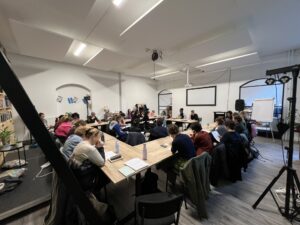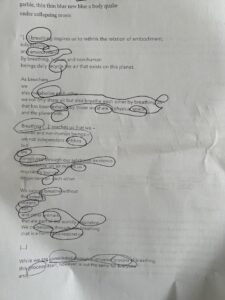Translingual Creative Writing
ILFU Workshop 3: The Agency of Breath
by Iris Bosma
“We don’t all breathe on equal terms. Breathing is a way to articulate (resistance to) these power relations.” – Magdalena Górska
“Poetry allows for mindfulness, slowing down being out of breath due to the fast pace of life.” – S*an Henry-Smith
The third Translingual Creative Writing workshop, held at the ILFU office behind the Dom Church, took place on 22 March 2024.
 In this workshop, Utrecht University researcher in Gender Studies Magdalena Górska1 and poet/artist S*an D. Henry-Smith2 entered into a conversation about writing and breathing, discussing them as concepts, forms and practices, and how they relate to each other – for example, how breathing can shape the reading experience through pace and rhythm.
In this workshop, Utrecht University researcher in Gender Studies Magdalena Górska1 and poet/artist S*an D. Henry-Smith2 entered into a conversation about writing and breathing, discussing them as concepts, forms and practices, and how they relate to each other – for example, how breathing can shape the reading experience through pace and rhythm.
Central to this workshop was the following question: “how does what we say affect the air around us and how does the air around us affect what we say?”

Before entering into conversation, the guest speakers explained the set-up of this workshop to the participants. The participants were encouraged to ‘harvest’ or ‘harness’ any of the words that they heard the guest speakers use in their texts and to use these in their own writing. The guest speakers then took turns reading from their poems, in Henry-Smith’s case, and from the essay “Why Breathing is Political” in Górska’s case. After briefly discussing each of these excerpts, the workshop participants dedicated some time to writing, which lasted for around five minutes each time.
An example of the discussion between Henry-Smith and Górska concerns the meaning of breathing: how does breathing relate to reading? According to Henry-Smith, poetry allows for mindfulness, for you to slow down, and catch your breath in the fast-paced life that many of us live. Górska argued that breathing is political: “we don’t all breathe on equal terms. Breathing is a way to articulate (resistance to) these power relations.” In other words, who gets to breathe? Whose lives become suffocating? And, on a less metaphorical level, who gets the privilege to breathe clean air? Who has to live in an area with polluted air?
These questions can also be viewed in light of literary writing, especially poetry. The use of breath in writing can be both a metaphorical and literal tool which shapes the text’s narrative and allows the readers to engage with the text on various levels. It is not just the meaning of the words that is important, but rather that the entire reading experience is shaped by the way breathing is incorporated in the writing.
An example of this was already evident in the first poem that was discussed. Henry-Smith started the workshop by reading one of their poems called “dirty nails”. It contains no punctuation marks, and when Henry-Smith first read it aloud, they asked the participants to be mindful of when they stopped to catch their breath. After this, the poem was read aloud a second time, but with everyone reading it at the same time, together. The practice of reading aloud together helped to be mindful of when pauses were added, by whom, and how frequently. Although there was no right or wrong way to do this, it was interesting to pay attention to such small details, which normally go unnoticed. Poetry is often meant to be read out loud. By playing with punctuation, or in this case by denying the reader allocated breathing pauses, the reading experience can be changed significantly.
As mentioned earlier, after each reading and discussion, participants had a few minutes to write down (and around) the words they ‘harvested.’ These intervals, however, were pretty short. Personally, I would have preferred to see fewer but longer writing moments. Although the shorter bursts of writing time did suit the idea of ‘harvesting’ words better than a longer writing time would have done, it resulted in a writing experience in which, after the first writing moment, I wasn’t sure what to write anymore. Did I continue what I started writing before? Or start something else entirely with the new ‘harvested’ words? By the time I had decided for myself, the writing time was almost over already.
Perhaps this particular point comes down to personal preferences. Near the end of the workshop, when participants were invited to share their work, I did realize how creatively this practice could be used. The effectiveness of the exercise was proved by the originality and resourcefulness of the participants.
In conclusion, the workshop effectively raised awareness of breath and air, and how this could be utilised when writing. ‘Harvesting’ words as a writing technique, which is akin to ‘found text’ practices, was also interesting to learn and will remain a valuable writing tool. The parallel between breath and harvesting words is striking: the ‘old’ is transformed into something ‘new’. The participants’ active engagement with the topics and discussions, and the growing awareness of how we were all sharing a space and sharing air together while writing, led to a lively and collaborative workshop all in all.
1 Magdalena Górska is Assistant Professor at the Graduate Gender Program, Department of Media and Culture Studies, Utrecht University. Her research focuses on feminist politics of breathing and vulnerability. She is the author of Breathing Matters: Feminist Intersectional Politics of Vulnerability (2016), co-editor of the Routledge Critical Perspectives on Breath and Breathing book series, and founder of the Breathing Matters Network.
2 S*an D. Henry-Smith lives and works in Amsterdam. Recent solo exhibitions include “tremor low” at ROZENSTRAAT in Amsterdam (2023) and “in awe of geometry & mornings” at White Columns in New York (2021). Their poetry collection Wild Peach (2020) was shortlisted for the PEN Open Book Award, and they are the author of two chapbooks: Body Text (2016) and Flotsam Suite: A Strange & Precarious Life, or How We Chronicled the Little Disasters & I Won’t Leave the Dance Floor Til It’s Out of My System (2019). They have received awards and fellowships from Amsterdam Fonds voor de Kunst (2023), the Fulbright Program (2020), The Poetry Project (2019), and Poets House (2017), among others. They have read and performed previously at 47 Canal, Solomon R. Guggenheim Museum, The Shed, The Studio Museum in Harlem, Brooklyn Museum, The Poetry Project, and Triple Canopy, among others. Henry-Smith regularly collaborates in sound, poetry, and performance with Dweller Electronics, Imani Elizabeth Jackson as Mouthfeel, Ryan C. Clarke, Danny Sadiel Peña, Gabrielle Octavia Rucker, and Derica Shields, among others.

